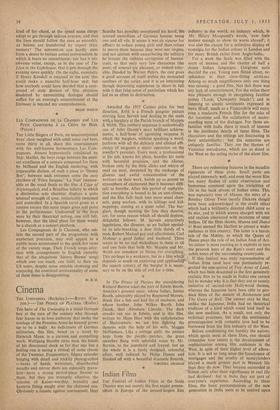Indian Films
THE Festival of Indian Films at the Scala Theatre was not merely the first major presen- tation in Europe of the second-largest film industry in the world, an industry which, in Mr. Hilary Marquand's words, 'now feels mature enough to show its wares abroad'; it was also the excuse for a collective display of nostalgia for the Indian colony in London and for many British exiles from Anglo-India.
For a week the Scala was filled with the scent of incense and the chatter of half a dozen Indian languages. Gorgeous saris dazzled the eye. Young men flitted about, re- splendent in their close-fitting atchkans. Among so much magnificence only one thing was missing : a good film. Not that there was any lack of entertainment. For the exiles there was pleasure enough in recognising familiar scenes (`Look, Chowpatty beach!') and in listening to simple sentiments expressed in basic Hindi, much as a Francophile will enjoy even a mediocre French film for the sake of the locations and the satisfaction of under- standing most of the dialogue. For those un- familiar with India there is much of interest in the incidental details of these films. The characters and the settings are fascinating in their unfamiliarity : but the scenarios are antiquely familiar. They are the themes of Victorian melodrama, which are as dated in the West as the acting styles of the silent film.
There are redeeming features in the maudlin rigmarole of these plots. Small parts are played extremely well, and even the worst film has many flashes of acute observation and humorous comment upon the trivialities of life in the back streets of Indian cities. This was especially true of Munna, the story of a Bombay Oliver Twist (surely Dickens should have been acknowledged in the credit titles) which had a brilliantly directed child actor as its star, and in which scenes charged with wit and realism alternated with moments of utter bathos. Of the films shown, Munna and Jhansi ki Rani seemed the likeliest to attract a wider audience in this country. The latter is a heroic tale of the Mutiny, in which the Queen of Jhansi plays the role of an Indian Joan of Are. Its colour is most exciting as it exploits in turn the peacock hues of the Rani's court and the ochre tones of the surrounding countryside.
If this festival was truly representative of Indian films (and here one particularly re- gretted the non-arrival of Two Acres of Land, which has been described as the first genuinely realistic film to be made in India) one cannot fail to wonder why it is that they are so tamely imitative of second-rate Hollywood themes, whereas the Japanese have been able to pro- duce films of the stature of Rashotnon and The Gates of Hell. The answer may be that, unlike the Japanese, India had no theatrical tradition of a kind which could lend itself to the new medium. As a result, not only the technical processes, but also the sentimental preoccupation with romantic love had to be borrowed from the film industry of the West.
Before condemning too harshly the naivety which spoils most of these films, one should remember how recent is the development of sophistication among film audiences in the West, in spite of their higher level of educa- tion. It is not so long since the foreclosure of mortgages and the cruelty of moneylenders played a much greater part in Western life than they do now. They became outmoded in fiction only after their significance in real life had declined : but in India they are part of everyone's experience. According to these films, the basic preoccupations of the new generation in India seem to be centred upon
two themes: sentimental romanticism in pri- vate life, and a longing for an ideal society in which there will be no oppressors and no oppressed. If the expression of these themes in films has been inadequate, there is reason to believe that this may not always be the case. With all their defects, the films shown in Ibis Festival proved that India has no lack of first-rate actors and technicians. The industry is ripe for its first D. W. Griffiths or De Sica to assert himself among the undistinguished com- pany of its present directors and producers. When that happens it will quite suddenly come















































 Previous page
Previous page